
 |
||||
|---|---|---|---|---|
| Volume 52 Number 28, November 19, 2022 | ARCHIVE | HOME | JBCENTRE | SUBSCRIBE |
Workers' Weekly Internet Edition: Article Index : ShareThis
Many Thousands Attend "Britain Is Broken" Demonstration
The working class of Europe and the Need for Political Power:
Mass Demonstrations of German Workers as Struggle Grows against the Crisis and WarTaking the democratic revolution that began with the Civil War through to completion:
375th Anniversary of the Putney DebatesUS Nuclear Exercise "Vigilant Storm":
US Provocative Nuclear Exercises Against the DPRK
UN General Secretary and Britain Defend the Ongoing US Military Provocations on the Korean PeninsulaDemands for Peace on Korean Peninsula:
Mass Protests in South Korea Demand an End to US War Exercises and Resignation of President YoonTheatre Review:
Noor Play Honours the Stand of WW2 HeroineDurham Miners Gala 2022:
Official Film to Premiere
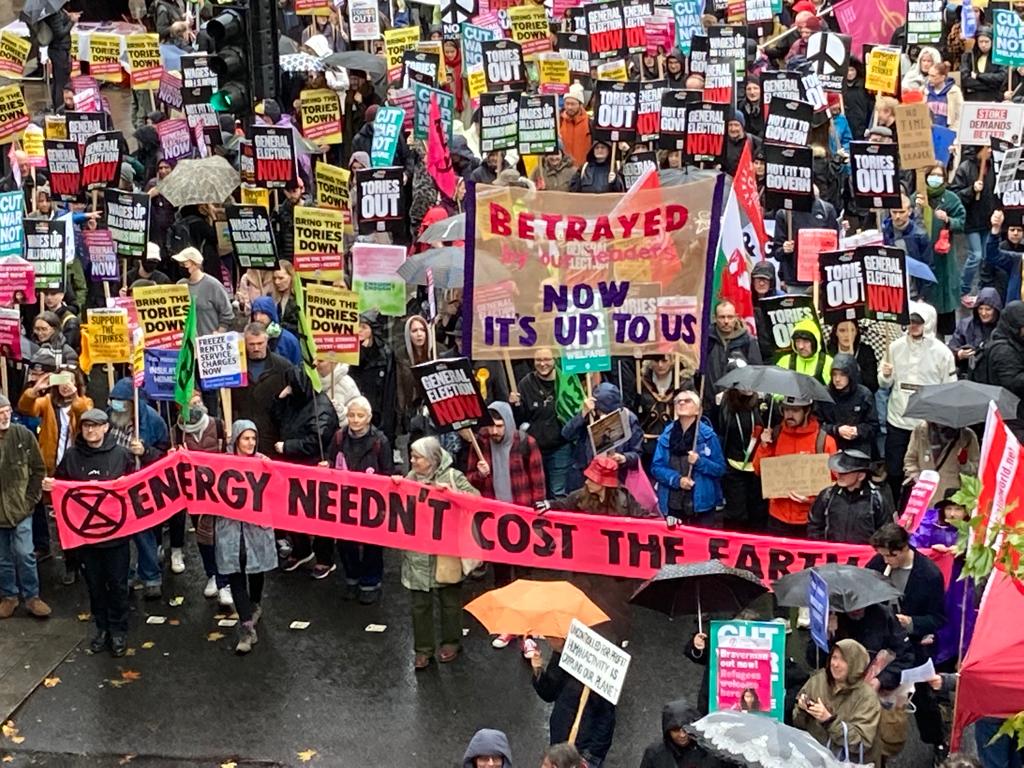
Many thousands gathered in central London on Saturday, November 5, to demonstrate against austerity and demand change. The march and rally were a manifestation of the revolt of working people against being made to shoulder the burden of the economic crisis caused by the worn-out social system with the rich in charge and they reflected the demand that the people themselves must be the decision-makers. They were a manifestation that the way forward lies in the fight for the rights of all, including opposing the state programme of racism which comes straight from the Home Office. The march and rally also drew attention to the anti-trade union laws and the government's plans to multiply the ways that workers must be forced by to work by the implementation of police powers.
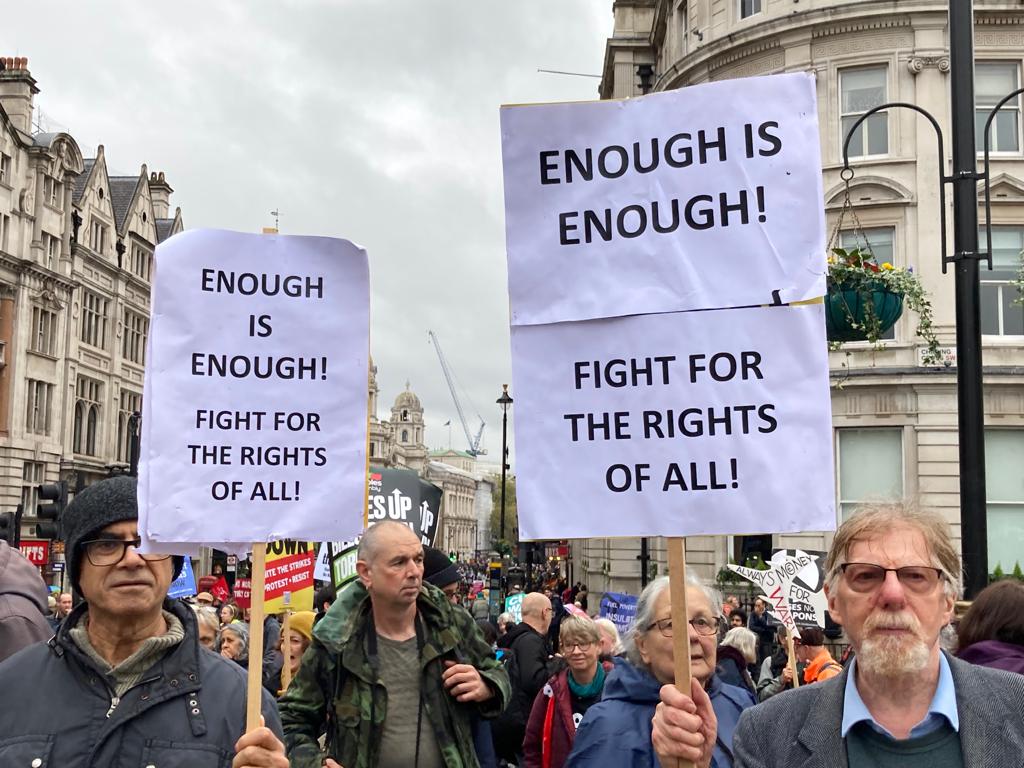
The "Britain Is Broken" protest was called by the People's Assembly, and supported by many trade unions and groups including CND, Just Stop Oil and Extinction Rebellion, as well as political groupings in which working people, especially the youth, militate. A contingent from RCPB(ML) participated with placards and distributing hundreds of copies of the latest Workers' Weekly [1]. The rain was not enough to dampen the overwhelming militant spirit of the protest as the march made its way from Embankment to Trafalgar Square, passing through Parliament Square and past Downing Street. Practically every participant carried a placard, and the shouting of slogans was non-stop. There were also many blocs with their banners, such as the Health Campaigners bloc and the Stop-the-War bloc, and groups carrying their flags were everywhere.
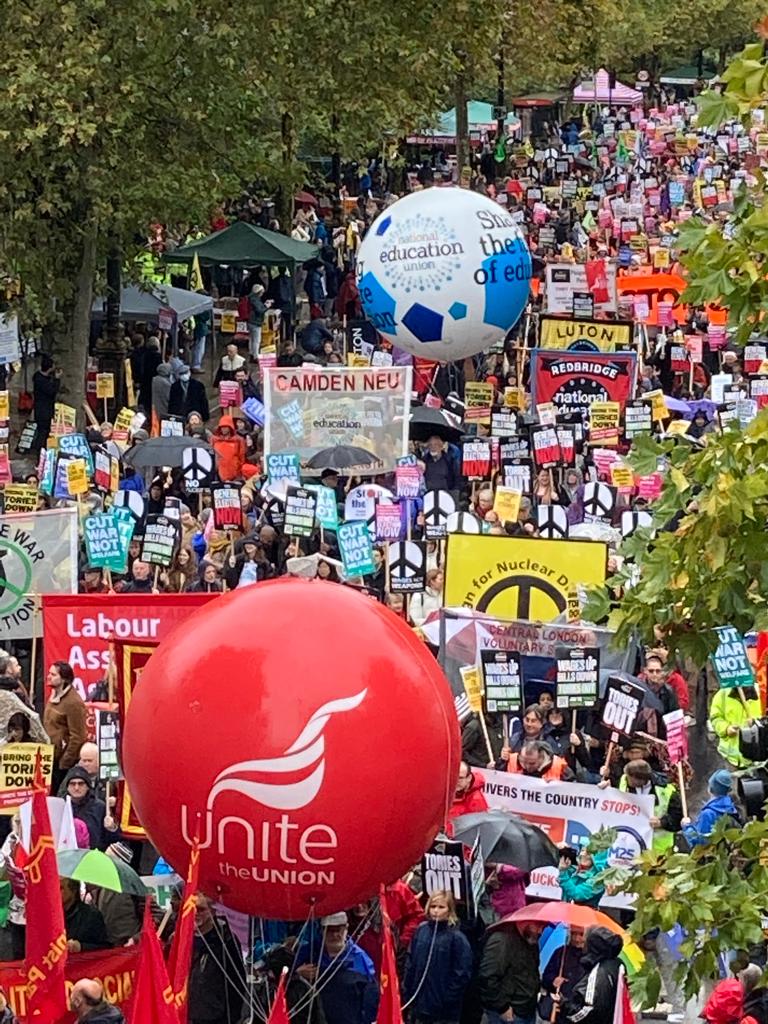 Speakers
at the rally in Trafalgar Square included Mick Lynch, the general secretary of
the Rail, Maritime and Transport (RMT) union - whose members had planned to
strike on Saturday until the action was suspended on Friday - and former Labour
leader Jeremy Corbyn, who said that the government would be forced to listen to
protesters calling for improved pay and workers' rights.
Speakers
at the rally in Trafalgar Square included Mick Lynch, the general secretary of
the Rail, Maritime and Transport (RMT) union - whose members had planned to
strike on Saturday until the action was suspended on Friday - and former Labour
leader Jeremy Corbyn, who said that the government would be forced to listen to
protesters calling for improved pay and workers' rights.
"The government is of course eventually forced to listen, as are the rail companies, therefore they have reopened negotiations with the RMT," he said. "The people out here are very determined. They're not going to see people with disabilities discriminated against, they're not going to see growing impoverishment in our society." Corbyn particularly took time in his address to debunk the myth that inflation is caused by the demand for decent wages and the opposition to the driving down of wages by inflation and the cost-of-living. The blame for this must be laid at the feet of the rich and oligarchs.
Mick Lynch, the general secretary of the Rail, Maritime and Transport union (RMT), addressed the huge crowds at Trafalgar Square. He vowed to "strike and strike again" until a "fair deal" is brokered for rail workers. He told the demonstrators: "I want to guarantee you one thing - our dispute is paused, the action is paused to allow for talks - but this dispute is not over. We are pressing on for a fair deal for our members, on pay, conditions and job cuts. We will not stop until our members decide that this dispute is resolved. If we don't get a deal from Network Rail and the train operators, we will strike and strike again until we bring them to the table and get a deal."
The former Labour MP Laura Pidcock, now the national secretary of the People's Assembly, said: "This Tory government is now totally unaccountable, but outrage is not enough. We have to come together as a movement to organise on the streets and in our communities, and show that our voices will not be silenced and that we want fundamental changes to the way our country is run. We will not get that from the politicians. We will only get that from the strength of a united, vibrant movement of working class people coming together, building together and making change together."
Many other speakers addressed the attentive crowd with unapologetic demands for their rights.
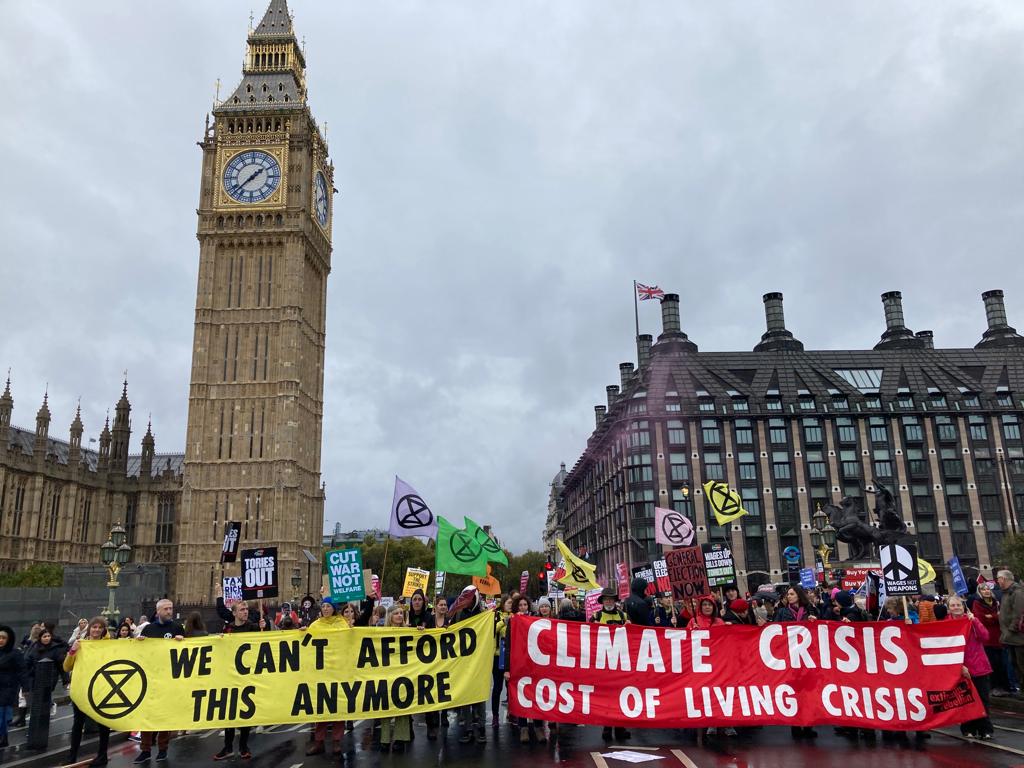
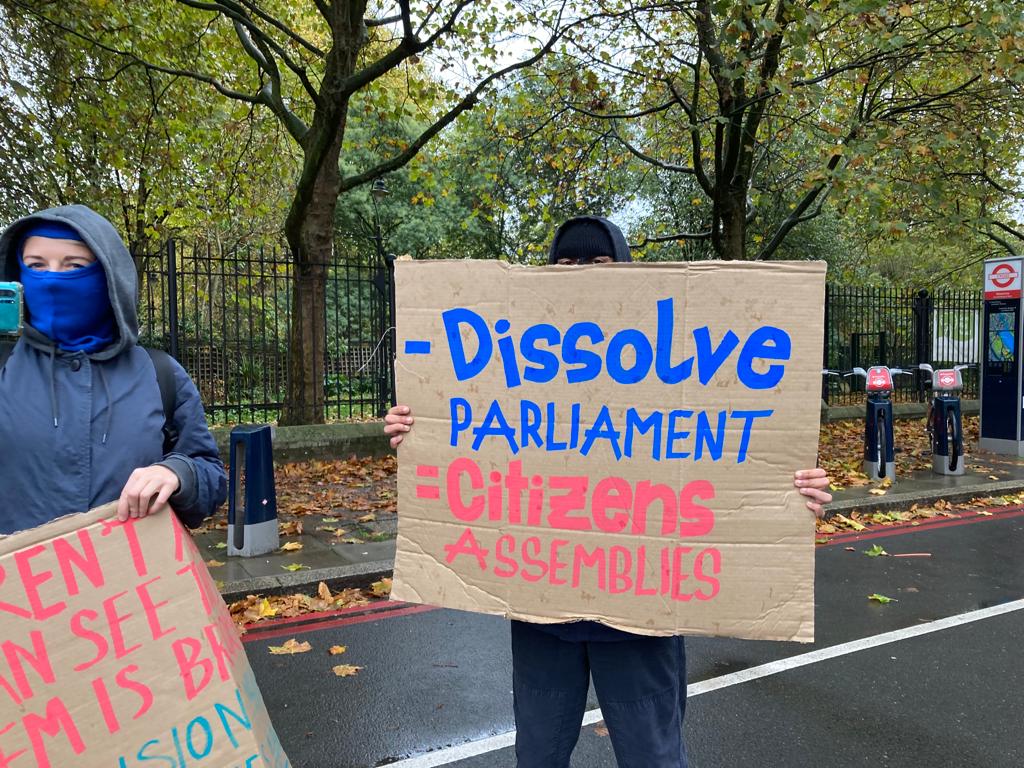
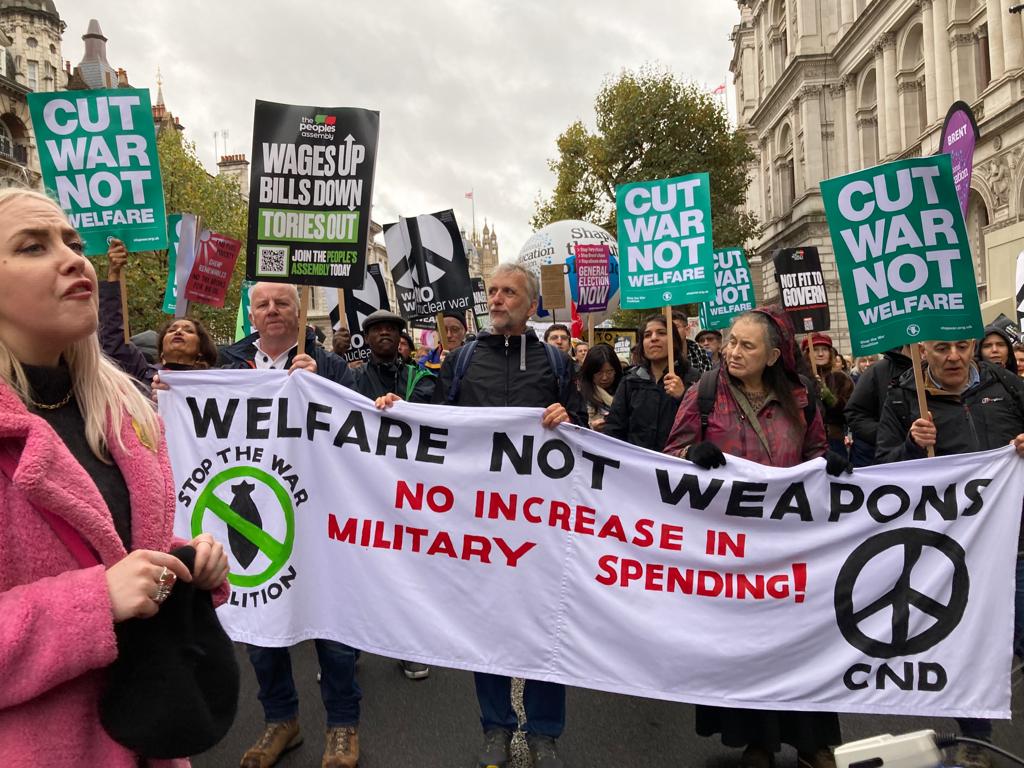
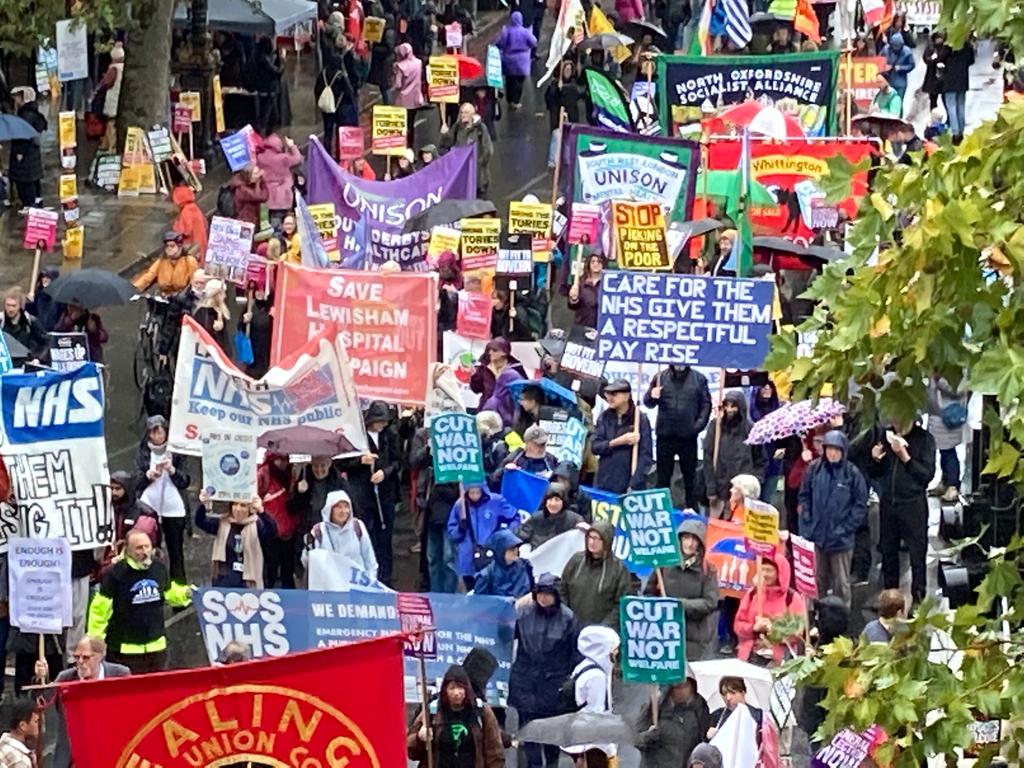
Note
1. See
http://www.rcpbml.org.uk/wwie-22/ww22-27/ww22-27-01.htm
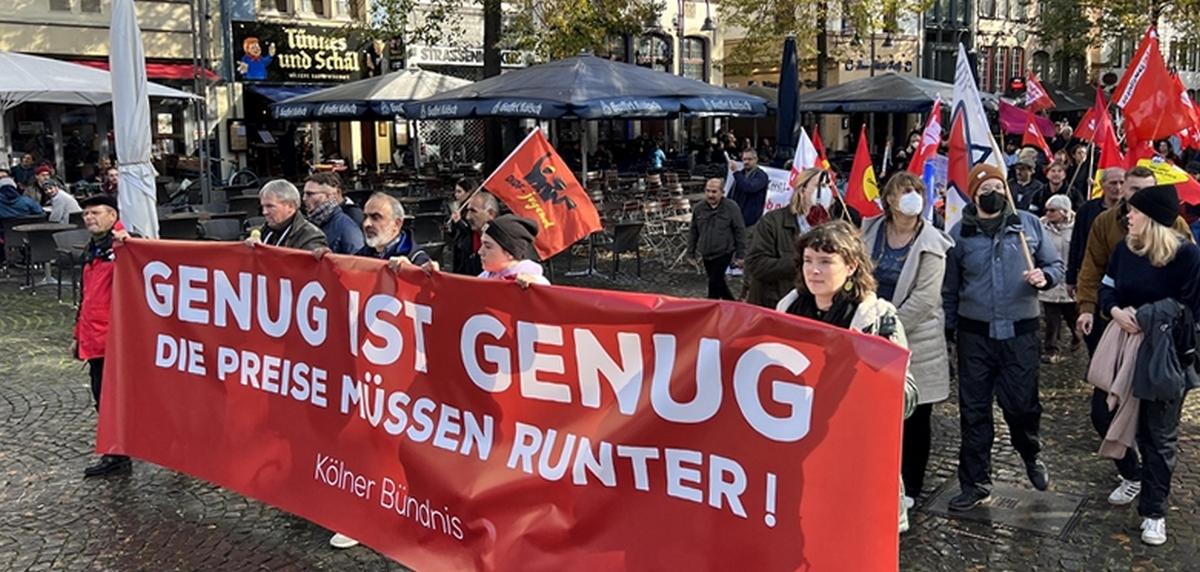
Cologne, Germany, October 1, 2022
There is a growing movement of workers throughout Europe as the global crisis bites. A new sense of internationalism is emerging amongst the international working class. A demonstration called by workers' unions and works' councils recently took place and marched between factories in Berlin. The workers are opposed to the owners of capital, who are trying to make the workers pay for the crisis, which has been exacerbated by the war in Ukraine.
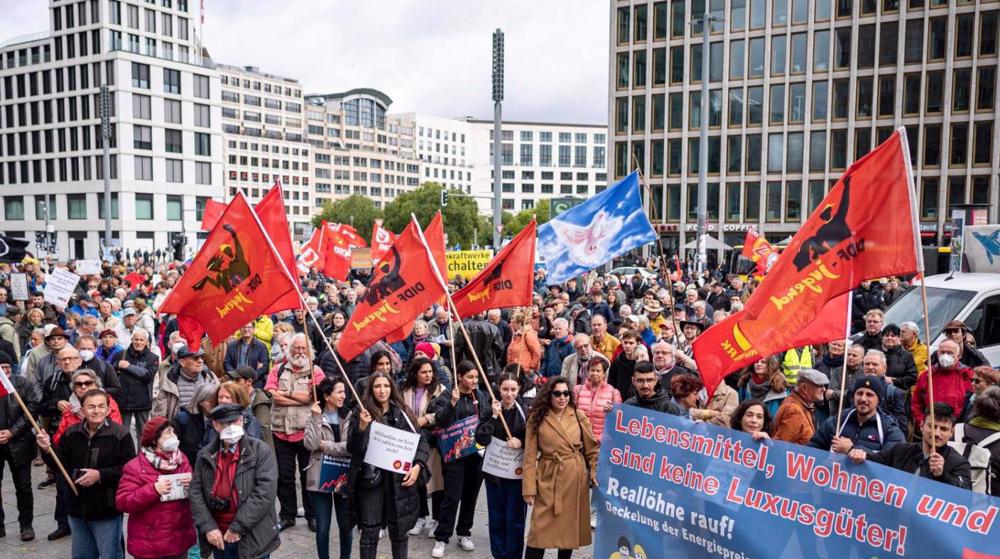
Berlin protests against soaring energy
prices
On November 8, IG Metall in Berlin called a "star march", starting from several factories and finishing with a rally at the Siemens plant on Nonnendammallee, a street in Berlin's north western Spandau district. It reflects the growing resistance in factories and workplaces.
The German government, as all European governments whether inside or outside of the European Union, including Britain, are faced with a force that refuses to be ignored: the resistance of the working class. This movement is growing in the face of rapid price increases, inflation, pandemic, war, attacks on working conditions in hospitals and schools and mass sackings and lay-offs in many industrial sectors, which have their roots in the global capitalist system. Workers and their organisations are discussing strategy and tactics around their developing outlook. The goal of worldwide imperialism and the German elite is to saddle the working class with debt repayment. In all European countries there have been gigantic sums handed out for military rearmament and the billion-dollar gifts given to the super-rich in the pandemic through the imposition of cuts in social spending and wages and price increases particularly in energy and fuel, as well as via direct pay-the-rich schemes.
The federal government in Germany used the war as a pretext for rearmament and military build-up, the biggest since World War II. At the same time, the effect of sanctions against Russia has been an explosion in energy prices, with effects for consumers and businesses.
Various social chauvinists and spokespeople for the reactionary "Germany First" call have hailed this pro-war policy. At the beginning of March, IG Metall and the Federation of German Industries (BDI) issued a joint statement, signed by IG Metall President Jörg Hofmann and BDI President Siegfried Russwurm. It says: "The top representatives of the Federation of German Industries and the IG Metall, who are also co-founders of the 'Future of Industry' alliance, strongly support the sanctions measures against Russia imposed by the German government, the European Union and the Western allies."
A joint statement by IG Metall Baden-Württemberg and Südwestmetall said that Russia's military action has produced a "united and determined" response from Germany, Europe and its allies.
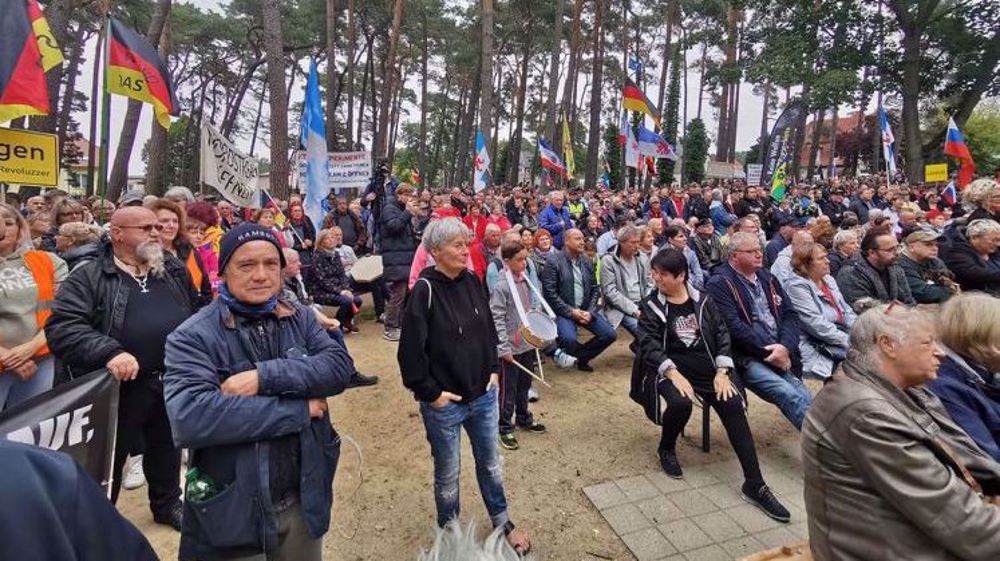
Lubmin, northern Germany protest demanding the opening of
Nord Stream 2
"We support the measures adopted," both organisations emphasised, leaving no doubt that this also means a dramatic increase in military spending. The sanctions against Russia "will demand sacrifices from all of us," the statement says.
Foreign policy across the European powers is itself in crisis, centred on the so-called "unity of NATO". The US wishes to lead NATO and Europe against Russia using the conflict in Ukraine. But NATO remains divided. Neither Germany nor any other European power has any desire to be put on rations by the US because of sanctions on Russia and the gas imports they rely upon. Germany is militarising at a rapid rate and organising to go against the norm since World War II that it would have no troops external to the country. The German question, since that time, which is part of the reason for NATO to exist, remains, which is to keep Russia out, Germany down, and the US on top. Instead, Germany is strengthening itself and conflicts like that over the Nord Stream pipeline and oil continue.
In spite of all of this, workers and their organisations are making it clear that they are determined to step up their struggles. They do not wish to follow the path of war or undermining of their rights or indeed the rights of all. The international working class never wants to see workers of one country fighting workers of another.
Recently, the Leibniz Institute for Economic Research at the University of Munich announced that the rapid rise in energy prices in Germany had resulted in a loss of almost 110 billion euros in real income. The German workers, like all workers internationally, will not accept the direction taken in the economy, and are building their resistance. Their demonstrations and actions are set to continue and are on the increase.

The Putney Debates
375 years ago this October and November, a series of unprecedented debates were held at St Mary's Church in Putney in the midst of the English Civil War. The matter at hand was how the country would be constituted anew after the defeat of the King, central to which were the questions of rights, and of the nature of supreme decision-making power and where it lies.
The debates were organised in direct response to the political agitations of the most democratic elements of the revolutionary New Model Army, the Levellers, whose demands, put forward in the name of the people, were unacceptable to the army elite: Oliver Cromwell, Henry Ireton, and other senior "Grandees".
This elite belonged to and represented the rising landed gentry and mercantile classes, whose interests lay in seizing power for themselves and denying the broad masses any share in that power. These political personalities at the head of the army had hoped the debates would settle matters and effectively silence the voice for extending democracy, so that a peace settlement following Parliament's victory over the King could be found that was in their favour.
The Civil War had broken out in 1643 as a result of the clash between the mercantile class and landed gentry with the old feudal order headed by the King over the sovereign power. This clash became manifested as a battle for control between King and Parliament, and with the outbreak of open war, it was fought on the battlefield.
With the victory over the King's forces, the New Model Army, assembled by the Parliamentary forces to wage the war, became the means for holding power over the state. Indeed, it became a claimant to the sovereign power itself. Having removed King Charles from the custody of Parliament in June 1647, the army established its headquarters in Putney, close to the City of Westminster in London, as a seat of power.
Such contradictions between the army and Parliament, and within the army itself, are what led to the holding of the Putney Debates from October 28, 1647. The last straw was the publication by radical army agitators of the political pamphlet The Case of the Armie Truly Stated and the Levellers' draft constitution for the country, the Agreement of the People.
Cromwell chaired the debates, who, along with Ireton and other senior officers, formed one side in the debates. At that stage (before the beheading of Charles I in 1649) this side favoured retention of a monarchy with reduced powers. The other side of the debates were the Levellers, Apprentices, and other democratic groupings who put forward popular sovereignty and demanded extended suffrage, regular parliaments, and recognition of basic rights, such as equality before the law.
On the right to vote, leading Leveller Colonel Thomas Rainsborough said:

Page from the Putney debates record book, 1647, located
at Worcester College, Oxford, MS 65 ff.34v-35r, showing the handwritten record
of the conversation. Worcester College, Oxford.
"... really I think that the poorest he that is in England hath a life to live, as the greatest he; and therefore truly, ... I think it's clear, that every man that is to live under a government ought first by his own consent to put himself under that government; and I do think that the poorest man in England is not at all bound in a strict sense to that government that he hath not had a voice to put himself under..."
Ireton, for the Grandees, retorted:
"For my part, I think it is no right at all. I think that no person hath a right to an interest or share in the disposing of the affairs of the kingdom, and in determining or choosing those that shall determine what laws we shall be ruled by here - no person hath a right to this, that hath not a permanent fixed interest in this kingdom..." - by which he meant property. Suffrage should be restricted to landowners.
The democratic conception expressed by the Levellers was grounded in their doctrine of natural rights, an early expression of the modern definition of rights as held by all people by virtue of being human. Ireton, Cromwell, and the rest of the Grandees vigorously opposed this doctrine, as they knew it led to the end of themselves as embodying the supreme power at that time. Indeed, the Levellers' great contribution was to uphold neither monarchic nor parliamentary sovereignty, nor army rule, but that sovereignty should be vested in the people.
They declared inalienable rights such as freedom of conscience and equality before the law. Their notion of freedom was profound in the context of their time, including within it the right to participate in decision-making. To the new ruling clique, this threatened their very existence, and so in response they raised the spectre of "the mob" and "anarchy". Fearing the consequences of the debates treading on increasingly dangerous ground and undermining their authority, the Grandees suspended the debates on November 8. The escape of Charles from Hampton Court Palace three days later set the seal on this period of open discussion.
Hobbes, who was writing his Leviathan at the same time as these events (published just four years later), gave as the starting point of his political theory the "war of all against all" that he claimed arises out of human self-interest. An absolute and indivisible sovereign power was necessary to prevent the always-simmering state of civil war from boiling over. At the debate, Ireton likewise asserted that the need for strong government arises out of the need to maintain order.

Words of Colonel Rainsborough - The Putney
Debates
Hobbes' new conception, which came to underpin the arrangements eventually found in the constitutional monarchy after the Restoration of Charles II in 1660 and the so-called Glorious Revolution of 1688, located the sovereign power in a symbolic person of state, representing a Covenant or agreement enacted between the ruling elites, the people and the state itself. The crucial feature of this conception is that the people hand over their ability to speak in their own name by this Covenant. It served to provide the veneer of legitimacy, purporting to represent the collective will, while in reality representing the interests of the new ruling class via its artificial person of state, the monarch.
This artificial person of state is the form of democratic personality given rise to at that time, which arose out of conditions of civil war, to manage the contending powerful interests while suppressing the popular voice, to halt the continuing battle of democracy. It is this system that still exists in the present, but which is now in utter crisis. Today, this personality reveals itself as anything but democratic. The mask is off, and indeed, the ruling elite barely follow their own constitutional theory, if at all. Pragmatism now dominates, and increasingly open rule by police powers.
For the first time, the Putney Debates elaborated a demand for sovereignty not to lie with Parliament or any other force, but with the people. That was defeated at that time. In a sense, the call was ahead of its time. Those radical democratic forces who gave the call were unable to bring into being such a form of democracy. But that battle of what the content of democracy is, and what form it should take opened up at that time. The powerful forces at that time, which were in the ascendency, had to resolve that battle in a way that kept the people out of power.
It is noteworthy that Lenin, in speaking of the significance of the 1917 Great October Socialist Revolution in Russia, said that this revolution undertook the task of completing the democratic revolution that got underway in England in the 1640s and the two subsequent decades. So this is very much the call of the times today, a call echoing through the intervening centuries, and especially the watershed moment of the Russian Revolution which is still in the making: for a directly democratic voice where people, speaking their own name, directly form their collective will, so that the supreme decision-making power is directly exercised by the whole polity. The modern world requires modern arrangements that give voice to the people and enable the people to be the decision-makers, so taking the democratic revolution that began with the Civil War through to completion. Only in this way can society recognise the rights of all, bring the enormous productive forces under control, and direct the economy to meeting the needs of the people.
Note
For a transcript of the Putney Debates, see
https://press-pubs.uchicago.edu/founders/documents/v1ch15s1.html
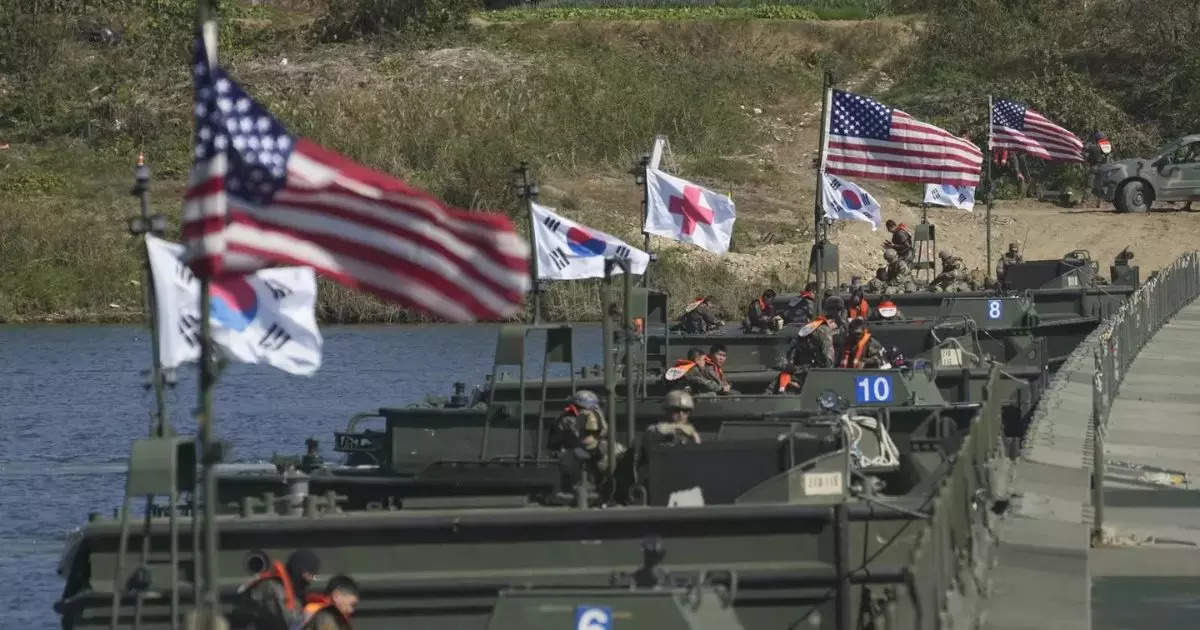
"Vigilant Storm" - Photo: Hundustan
News
The US has been holding a massive nuclear exercise on the Korean peninsula, "Vigilant Storm", which started on November 4 and followed on several days after the conclusion of the previous large-scale field mobile exercise, "Hoguk", which was staged across south Korea from October 17 to 28. Previously the US-South Korea joint military exercises were staged in April at full scale through the "combined command exercises" and were turned into a large-scale field mobile drill "Ulji Freedom Shield" in August and then into large-scale joint naval exercises with now the largest-ever joint air drill involving a nuclear carrier task force through September and October and into November.
"Vigilant Storm" has involved more than 140 fighters including F-35A stealth jets and F-15K and KF-16 fighters, as well as KC-330 tankers, while the US is deploying some 100 assets, including for the first time F-35B jets based in Japan, EA-18 electronic warfare aircraft and KC-135 tankers. Australia's Air Force joined the exercise with the deployment of a KC-30A tanker transport. It is a war drill aimed at aggression and mainly aimed at striking the strategic targets of the DPRK "in case of contingency in the Korean Peninsula".
The Democratic People's Republic of Korea (DPRK) and its Korean People's Army cannot be expected to remain passive onlookers to these reckless nuclear exercises. Turning truth on its head, the US claimed that the DPRK's testing of missiles is the "cause of raised tensions" on the Korean Peninsula and referred the matter to the UN Security Council (UNSC). In Foreign Ministry statements [1,2], the DPRK pointed out that "the US ignored the demands of the DPRK and regional countries and the self-evident principle of maintaining a peaceful stable environment and instead responded by staging combined air drills for aggression under the pretext of deterring and coping with any provocation. And it decided to extend the training period, originally scheduled until November 4, over the DPRK's legitimate self-defensive countermeasure, and went the length of calling a UNSC meeting, another provocative action."
The DPRK Foreign Ministry justly demanded a halt to "Vigilant Storm" prior to its launch and during its progress. They point out that "owing to the large-scale war exercises staged by the US and its vassal forces almost every day this year, the Korean Peninsula remains the hotspot with the most serious military tensions in the world and the security circumstances in the region have become grimmer." The Foreign Ministry also points out, "All the facts clearly show that the US nuclear war scenario against the DPRK has entered the final stage" of nuclear threats against the DPRK. It emphasises, "The US is trying to shift the responsibility for the escalated tensions onto the DPRK after making the DPRK take a countermeasure." They point out that such schemes can no longer work to conceal the true colours of the US "as the chief culprit in destroying peace and security, and conclude: "No matter how the situation may develop and what kind of unimaginable situation may arise, the DPRK will never flinch from the just road for defending the dignity and sovereignty of the state and the security of the people. The US should not act rashly."
It is important to point out that the DPRK has committed no act of aggression against another country unlike the US, Britain and other powers that condemn the DPRK's existence and right to be. The Korean War, which engulfed the entire Korean Peninsula, was provoked by the US and the regime it installed in the south. Standing firm against the might of the US military empire - known for its use of nuclear, chemical and biological weapons worldwide - the DPRK is affirming not only its right to be, but the right of all nations and peoples to self-determination and peace. For this internationalist spirit, the DPRK is justly admired by all justice and peace-loving people in Britain and throughout the world.
Workers' Weekly condemns the refusal of the British government to oppose and call for an end to these ongoing and large scale military exercises against the DPRK. Also, Britain should refuse to submit to the US-inspired policy of sanctions and threats against the DPRK and its leadership.
The peace-loving people of Britain wish the DPRK and the Korean people every success in their striving to secure peace on the Korean Peninsula and to put an end to the more than 70 years of US-engineered division, tension and strife between north and south so that the Korean people can move forward as united, peaceful and prosperous peoples.
Notes
1. KCNA Statement of DPRK Foreign Ministry Spokesman, October 31 2022
http://www.kcna.kp/en/article/q/389b4b6d4d92a66d210125543c87c1d6016afc72a1199169a0e9defc1b96f3d1.kcmsf
2. KCNA Statement of DPRK Foreign Ministry Spokesman, November 4 2022
http://www.kcna.kp/en/article/q/a0a28e6f322e1851bdae3a89fbcbdf05.kcmsf

Kim Son Gyong, vice-minister for International
Organisations of the Foreign Ministry of the Democratic People's Republic of
Korea
On the afternoon November 4, The UN Security Council conducted an "open briefing" [1] on the Democratic Peoples' Republic of Korea (DPRK) at the behest of "the UK and the US" as well as "Albania, France, Ireland and Norway". The briefing "included Japan and the Republic of Korea (ROK) will participate in the meeting under rule 37 of the Council's provisional rules of procedure". In the way that the Anglo-US imperialist powers dominate the proceedings of the UN, no mention is made of inviting the DPRK to the briefing which was called by the US "after the DPRK conducted missile tests on 2 November and 3 November". While the briefing was forced to refer to the fact that the "tests came days" after the US and the ROK began a series of "training drills" known as "Vigilant Storm", which involves "hundreds of ROK and US warplanes" there was no referral to the significance of these US military provocations on the Korean Peninsula but rather echoing the US claims that these were "defensive" for the United States. Also it should be noted, the US used the briefing to arrogantly announce "that 'Vigilant Storm', which was due to end on 4 November, will be extended indefinitely".
Whilst there was no conclusion to the briefing (the report admits that Russia and China in particular would not agree to the US position), Stéphane Dujarric, Spokesman for the Secretary-General said on November 4 that the "Secretary-General reiterates his calls on the DPRK to immediately desist from taking any further provocative action". A similar statement was issued by the British Foreign, Commonwealth & Development Office Minister of State, Anne-Marie Trevelyan, "condemning the latest missile tests by The Democratic People's Republic of Korea (DPRK) on 3 November". In their statements the Secretary General of the UN and Britain made no mention of the provocative war exercises of the US that have been conducted on an ongoing basis on the Korean peninsula and which are to continue "indefinitely".
In a press statement on November 8, Kim Son Gyong, vice-minister for International Organisations of the Foreign Ministry of the Democratic People's Republic of Korea, said:
"I express strong regret at the fact that the UN secretary general issued a statement on November 4 groundlessly pulling up the DPRK over its just counteraction for self-defence to cope with the US military provocations, and categorically reject it.
"The DPRK Foreign Ministry has already clarified that the military drills for counteraction conducted by the Korean People's Army were a due reaction to the largest-ever combined air drill staged by the US and south Korea.
"This being a hard fact, the UN secretary general is echoing what the White House and the State Department say as if he were their mouthpiece, which is deplorable.
"Who committed the provocation and who is to be blamed for it?
"If the war drills being staged in a frantic manner by openly introducing an aircraft carrier and strategic bombers against the sovereign state are described as 'defensive' and the exercise of the just right to self-defence to cope with them is branded as 'provocation', the UN, whose most important mission is to maintain global peace and security, will lose its justification for existence.
"Being the chief of the UN, a world-wide body, he should remain faithful to the mission and universal value of the UN which regards equity and objectivity as its lifeblood, and should not be biased towards the interests and views of a big power or a small group in judging and dealing with all matters.
"I think that the unfair and prejudiced behaviour of the UN secretary general is to blame to some extent for the situation on the Korean peninsula getting so serious."
The statement concludes.
"If the UN secretary general truly wants to contribute to maintaining the world peace and stability, he would be well advised to stop dancing blindly to the tune of others and focus on getting rid of the source of provocation with correct insight."
Note
1. DPRK (North Korea): Open Briefing - Security Council Report
- November 4, 2022
https://www.securitycouncilreport.org/whatsinblue/2022/11/dprk-north-korea-open-briefing-2.php

Demonstration in Seoul, Korea, August 13, 2022 against
U.S./south Korea joint military exercises. Photo: Xhinhua
Hundreds of thousands of workers, teachers, youth and others marched in Seoul, the capital of the Republic of Korea (ROK), on October 22 to oppose the pro-US and militarist government of President Yoon Suk-Yeol and called for his removal. Yoon, the leader of the People's Power Party, came to power in May having won the elections this past March with the slimmest of margins, less than one per cent more votes than his rival, Lee Jae-myung of the Democratic Party.
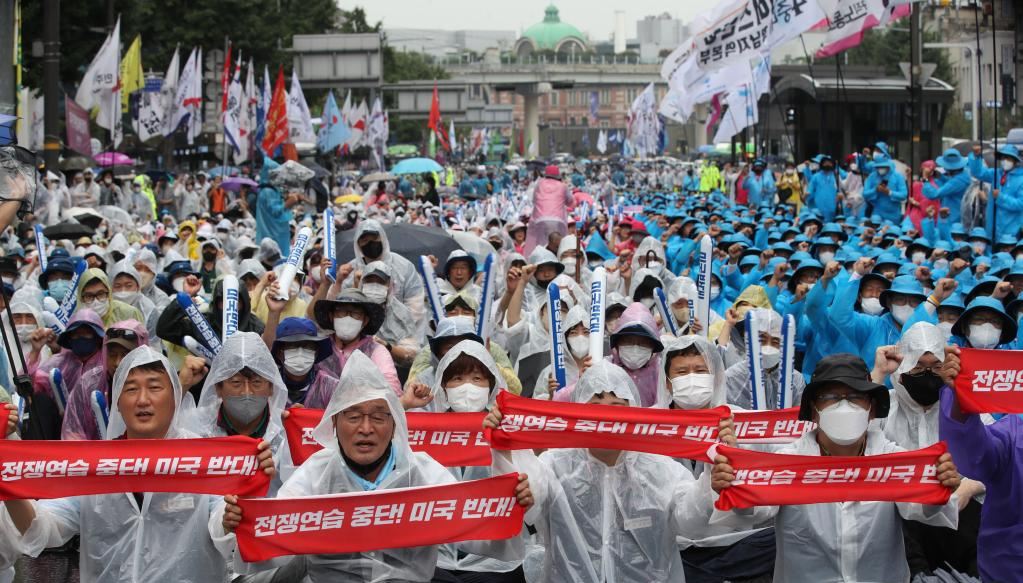
Seoul, Korea, August 13, 2022 protest against U.S./south
Korea joint military exercises. Photo: Xhinhua
The ongoing actions for peace by the people of south Korea are of such significance they were recently reported by Stars and Stripes which identifies itself as the US military's independent magazine. In a September 7 article, the magazine reports on the popular resistance to the never-ending US-ROK military exercises, and quotes Lee Seung-bin, an engineering student and anti-war activist stating: "The fact is that this is not an exercise of a defensive nature but an exercise for attacks against North Korea (DPRK). It is too obvious that these drills do not bring peace to the Korean Peninsula but can cause confrontation between North Korea and the US and a war crisis."
The magazine also stated, "Protests outside Yongsan Garrison in Seoul and 40 miles south at Camp Humphreys prompted gate closures." It noted: "Outside Humphreys, activists took turns holding banners with messages criticising their government's relationship with Washington. In Seongju, roughly 130 miles south of the capital, protesters have regularly staged demonstrations in front of a south Korean military base that has housed the US-made Terminal High Altitude Area Defense, or THAAD, system since 2017. Protesters there previously blocked roads leading into the base and prevented the delivery of supplies."
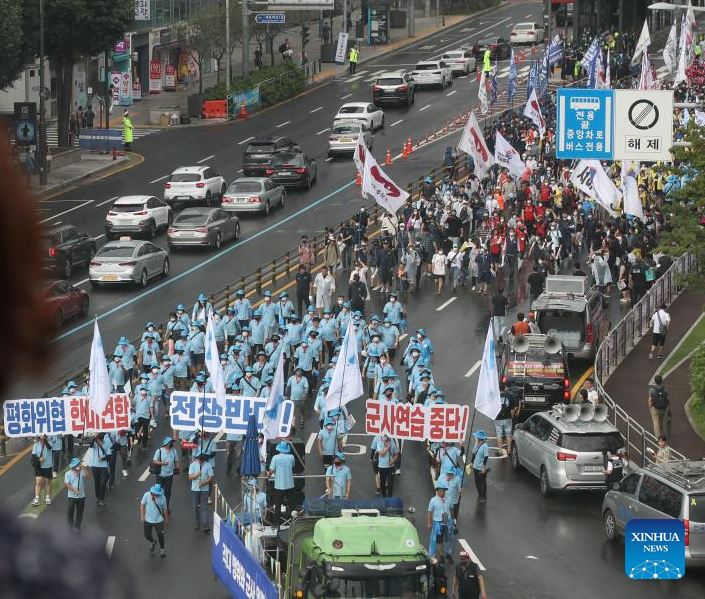 The monopoly media in Britain deliberately does not report on the
anti-war actions of the people in the ROK for peace on the Korean Peninsula but
rather busies itself with reinforcing the American disinformation campaign
targeting the DPRK as the aggressor.
The monopoly media in Britain deliberately does not report on the
anti-war actions of the people in the ROK for peace on the Korean Peninsula but
rather busies itself with reinforcing the American disinformation campaign
targeting the DPRK as the aggressor.
The protests in south Korea clearly identify the US as the main threat to peace on the Korean Peninsula and call for the removal of President Yoon. Yoon is condemned as a tool of US militarisation of south Korea and for undermining the prospect of the Korean people providing themselves with peaceful solutions for the future of the Korean Peninsula.
Yoon assumed office as president on May 10, 2022. Since taking office, his government has stepped up joint military exercises with the US against the DPRK. He has agreed to deployment of American THAAD missiles, disregarding the legitimate concerns of both China and the DPRK as well as the people of south Korea. Yoon's government is strengthening the US-ROK-Japan Trilateral Alliance which threatens the peace and stability not only of Korea but China and the Asia Pacific region in general. Since coming to office, Yoon's government has also opened a ROK NATO office in Brussels and has joined NATO members in various military exercises, as well as providing US weapons bought by the ROK to Ukraine to fuel the conflict there.
Korea is One! The Korean people are one people. The British people must stand with the people of Korea, north and south, who are determined to oust the US warmongers from their land so as to secure peace and reunification and a bright future for themselves and the people of the region.
(With files from Hankyoreh, Stars and Stripes)
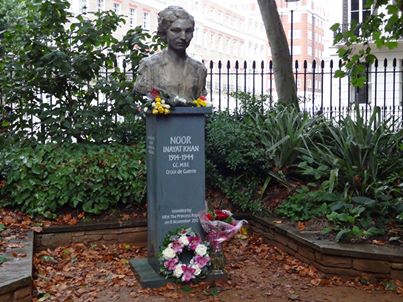
Memorial Bust of Anti-Fascist Heroine Noor Inayat Khan in
Gordon Square, central London
The play Noor by Azma Dar is running at the Southwark Playhouse, London, until November 26. Noor Inayat Khan, a descendent of the legendary Tipu Sultan and from a Sufi family, grew up in Paris to be a musician and writer of children's stories. Following the Nazi invasion of France, she moved to England, volunteered for the RAF, was recruited by the Special Operations Executive (SOE), and sent back to occupied France as the first female wireless operator. With her network betrayed and destroyed, she nonetheless carried on her dangerous undercover work until she herself was betrayed and captured. Refusing to co-operate with her captors and revealing nothing, she was sent to Pforzheim Prison in Germany, cruelly shackled hand and foot for ten months, then moved to Dachau concentration camp, where she was separated from her fellow prisoners on account of her dark skin, and on the night of September 13, 1944, dreadfully abused by the sadist Commandant and shot dead. Her last and only word was Liberté! She was 30 years old. She was posthumously awarded the George Cross and the Croix de Guerre for her outstanding bravery.
The Kali Theatre production at the Southwark Playhouse, imaginatively directed by Poonam Brah, tells Noor's story and honours her heroism. As author Azma Dar says in her programme notes, the play is relevant to our own dangerous times. The production is quite brilliant. Direction, movement and the acting of the entire ensemble are outstanding. In particular, the performance of Anice Boparai as Noor is heart-wrenching, while the scenes with Caroline Faber as Vera Atkins, Noor's SOE handler in London, and Chris Porter, as Noor's German captor in Paris, and especially their later meeting at a War Crimes Tribunal investigation, are subtly and superbly acted. Laurence Saunders and Ellie Turner should also be mentioned. As war rages again in Europe, with the warmongering US, UK governments and their allies waging war against Russia to the last Ukrainian, expanding NATO control, threatening further death and destruction in Europe and beyond, Noor's heroic stand in the face of war and racism is certainly relevant and worthy of honour. This play at the Southwark Playhouse is a must see!
See also:
Book review: The Spy Princess by Shrabani Basu
http://www.rcpbml.org.uk/articles/noor.htm
Workers Weekly Internet Edition Year 2012 Volume 42 Number 34
http://www.rcpbml.org.uk/wwie-12/ww12-34.htm#third

The official film of the 2022 Durham Miners Gala will premiere on Sunday evening, November 20, 2022.
After a three-year absence due to Covid 19, the Gala returned in style. It was the biggest Big Meeting in decades - and film crews were there to capture it all.
More than 200,000 people packed the streets of Durham and almost 70 Durham miners' banners paraded, accompanied by more than 50 brass bands - the most at any Gala since the 1960s.
The Gala was dedicated to all our keyworkers who got us through the pandemic. Keyworkers were the Durham Miners Association's guests of honour, taking pride of place on the balcony of the County Hotel and the speakers platform on the Racecourse. In a Gala first, two rank and file key workers spoke alongside the leaders of trade unions representing key workers.
Commissioned by the Durham Miners Association (DMA) and the Friends of Durham Miners Gala, the short film captures the sights and sounds throughout Gala day.
Filmed in an observational style, it features the bands, the banners, the people, the speeches, and the Cathedral service.
It reminds us why Gala day is the greatest day of the year.
The 15-minute film will premiere live on the Gala's Facebook and YouTube channels at 7pm on Sunday 20 November - the anniversary of the founding of the DMA in 1869.
Watch on YouTube here. [https://youtu.be/3haHzjikRUg]
Watch on Facebook here. [https://fb.me/e/3b7ik1gYd]
(Friends of Durham Miners' Gala)
For a report of the 136th Durham Miners Gala and Big Meeting, see: http://www.rcpbml.org.uk/wwie-22/ww22-18/ww22-18-01.htm
Receive Workers'
Weekly E-mail Edition: It
is free to subscribe to the e-mail edition
We encourage all those who support the work of RCPB(ML) to also support it
financially:
Donate to
RCPB(ML)
Workers' Weekly is the weekly on
line newspaper of the
Revolutionary Communist Party of Britain (Marxist-Leninist)
Website:
http://www.rcpbml.org.uk
E-mail:
office@rcpbml.org.uk
170, Wandsworth Road, London, SW8 2LA.
Phone: 020 7627 0599: